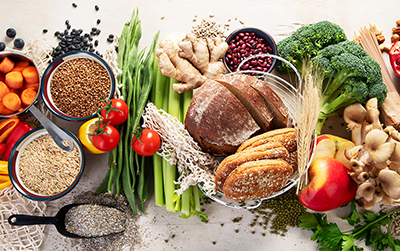The Impact of Stress and Anxiety on Digestion
Stress and anxiety have become common aspects of modern life, and their effects extend well beyond mental health. One of the areas most affected during periods of heightened stress is the digestive system. It is as if our gut becomes directly affected by all that tension as well.
The Gut-Brain Axis: A Bidirectional Communication Pathway
The relationship between the brain and the digestive system is bidirectional, meaning they communicate with each other regularly. This communication is regulated by the gut-brain axis. The gut-brain axis connects the central nervous system (CNS) with the enteric nervous system (ENS), often referred to as our “second brain.” Through chemical messengers like hormones and neurotransmitters, the gut both influences and is influenced by your mental state.
Think back to a time when you received big news, whether it was exciting or a bit more on the sad side. Did you feel something in your gut? Maybe butterflies fluttered around, or a wave of nausea hit. That was your body’s way of showing just how much stress and emotions can make an impact on your digestion!
Your enteric nervous system is a network of nerves located in the walls of your digestive tract, stretching from the oesophagus to the rectum. The ENS is responsible for managing digestion, including the movement of food, the release of digestive enzymes, and blood flow to the gut.
Did you know that about 90% of your serotonin is produced in your gut? Serotonin helps regulate mood, sleep, appetite, and digestion. This highlights just how closely your mental health and digestive health are linked.
Four Ways Stress and Anxiety Impact Digestion
Changes in Gut Motility
Stress and anxiety can lead to changes in how quickly or slowly food passes through your system. Slowed digestion is commonly associated with constipation and accelerated digestion with diarrhea. Both symptoms are common in irritable bowel syndrome (IBS), which can be influenced by levels of stress.
Alterations in Stomach Acid Levels
During periods of stress, stomach acid levels can either increase or decrease. An increase in stomach acid can lead to symptoms of reflux and heartburn, whereas a decrease can impair digestion and nutrient absorption.
Increased Intestinal Permeability
Over time, stress and anxiety can weaken the intestinal lining, making it more permeable. This can allow undigested food particles and toxins to enter your bloodstream, which may trigger inflammation and immune system reactions.
Impact on Gut Microbiota
Stress and anxiety can affect the balance of “good” and “bad” bacteria in your gut. This imbalance is called dysbiosis, which can lead to inflammation and other digestive problems over time.
Potential Physical Symptoms of Stress on Your Digestion
It is important to remember that everyone is unique, so how your digestive system reacts to stress might be different from someone else’s.
- Bloating
- Stomach cramps
- Nausea
- Heartburn
- Irregular bowel movements (constipation or diarrhea)
- Gas
- Loss of appetite or overeating (constant appetite)
Five Ways to Support Your Digestion
Eat Smaller, More Frequent Meals
Eating smaller, more frequent meals might reduce digestive discomfort and prevent overwhelming the digestive system.
Whether you are eating smaller frequent meals or larger spaced meals, it is important to practice mindful eating. Chew food thoroughly, eat slowly, and try to avoid distractions to support proper digestion.

Stay Hydrated
Drinking enough water aids in breaking down food and preventing constipation. You can also try herbal teas to support digestion.
- Ginger tea helps reduce nausea and promotes better digestion.
- Peppermint tea helps relieve bloating, gas, and cramping.
- Chamomile tea calms the digestive system and supports relaxation.
Include Fermented Foods or Try a Probiotic Supplement
Probiotics are live beneficial bacteria that support a healthy gut. Foods like yogurt, kefir, sauerkraut, kimchi, and miso provide natural probiotics for gut health. If you are struggling to get enough probiotic-rich foods, you can try a supplement. Probiotics can help improve digestion, reduce bloating, and alleviate symptoms of irritable bowel syndrome (IBS). Lactobacillus and Bifidobacterium are common strains that can help reduce symptoms of IBS.

Focus on Eating More Fibre
Getting enough fibre in your diet supports your health in many ways including digestion, weight management (helps increase fullness), and heart health. Eating enough fibre will ensure that you are feeding your good gut bacteria. Foods like bananas, garlic, onions, and asparagus feed good bacteria
in your gut, enhancing gut health. You can also consider a fibre supplement. Products like psyllium husk or acacia fibre can regulate bowel movements and support a healthy gut microbiome.
Focus on Managing Your Stress
Your gut and brain are connected, so when you are feeling stressed, whether mentally or physically, your digestion can take a hit. One of the best ways to keep your digestion on track is by finding ways to manage that stress. It is all about figuring out what works best for you!
- Mindfulness and relaxation techniques
Practices such as deep breathing, meditation, and yoga can help regulate the autonomic nervous system and reduce the impact of stress on digestion.
- Regular exercise
It can help relieve stress and stimulate healthy digestion by enhancing gut motility and reducing inflammation.
- Getting enough sleep
Poor sleep quality can worsen both stress and digestion.
- Eating a balanced diet
Eating a fibre-rich diet with plenty of fruits, vegetables, and probiotics can support gut health. Avoiding excessive caffeine, alcohol, and processed foods may also reduce digestive distress.
- Taking time to get outside
Studies have demonstrated that just 20 minutes of outdoor time can significantly reduce cortisol levels, and sunlight exposure increases serotonin production. If you are reading this, it is your sign to get outside.

Angela Wallace, BSc, MSc, RDN
Angela is a registered dietitian, family food expert, and personal trainer with a passion for helping women and kids thrive through better nutrition. She specializes in weight management and digestive health.
eatrightfeelright.ca
Further Reading
Caspar‑Bauguil, S., P. Legrand, and S. Boudjema. “The role of gut microbiota in the pathogenesis of autoimmune diseases.” Frontiers in Immunology, Vol. 11 (2020): 1823.
Hamed, E.A., and D. Minoo. “Dysbiosis and its impact on gut-liver axis in the context of gastrointestinal disorders.” Frontiers in Gastroenterology, Vol. 15, No. 5 (2024): 1342888.
Goldstein, S.D., and R.R. Kennedy. “Gastrointestinal microbiota and its relationship with human diseases.” Journal of Clinical Gastroenterology, Vol. 13, No. 5 (2024): 1361.
Bland, R., A. Kinsella, and M. Robson. “Gut microbiome and its therapeutic role in gastrointestinal diseases.” Gut, Vol. 47, No. 6 (2024): 861–869.
Lee, A.H., and S.L. Li. “Impact of outdoor exposure on mental health: A systematic review of nature-based interventions.” Sustainability, Vol. 13, No. 7 (2024): 4015.
[No author listed.] “Stressed? Take a 20‑minute nature pill.” Frontiers, 2019‑04‑19, https://www.frontiersin.org/news/2019/04/09/20-minute-nature-pill-relieves-stress.

